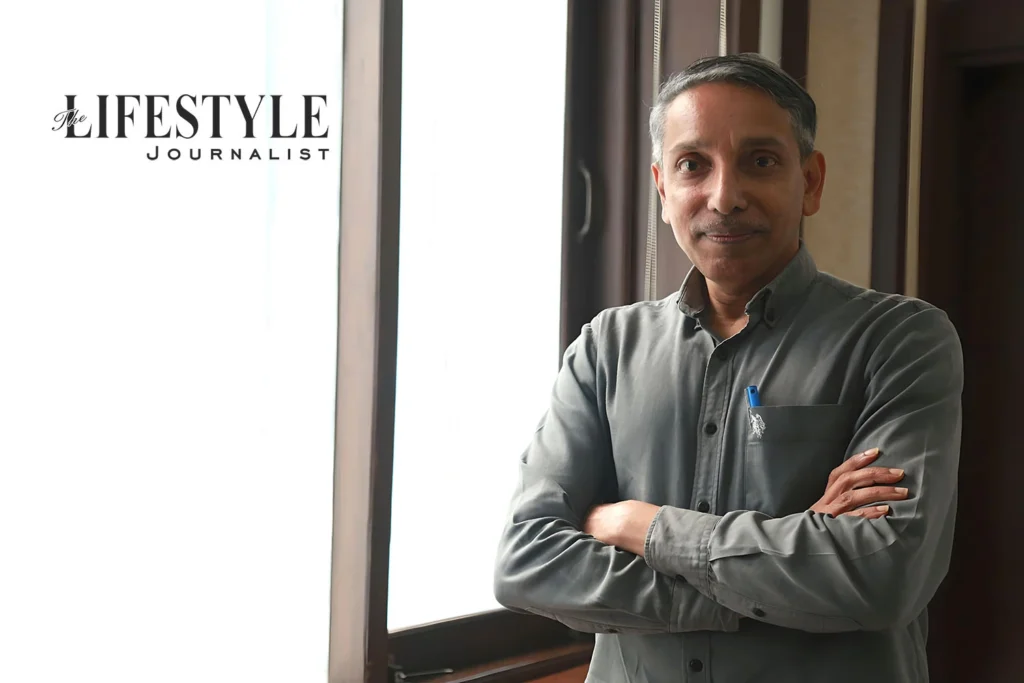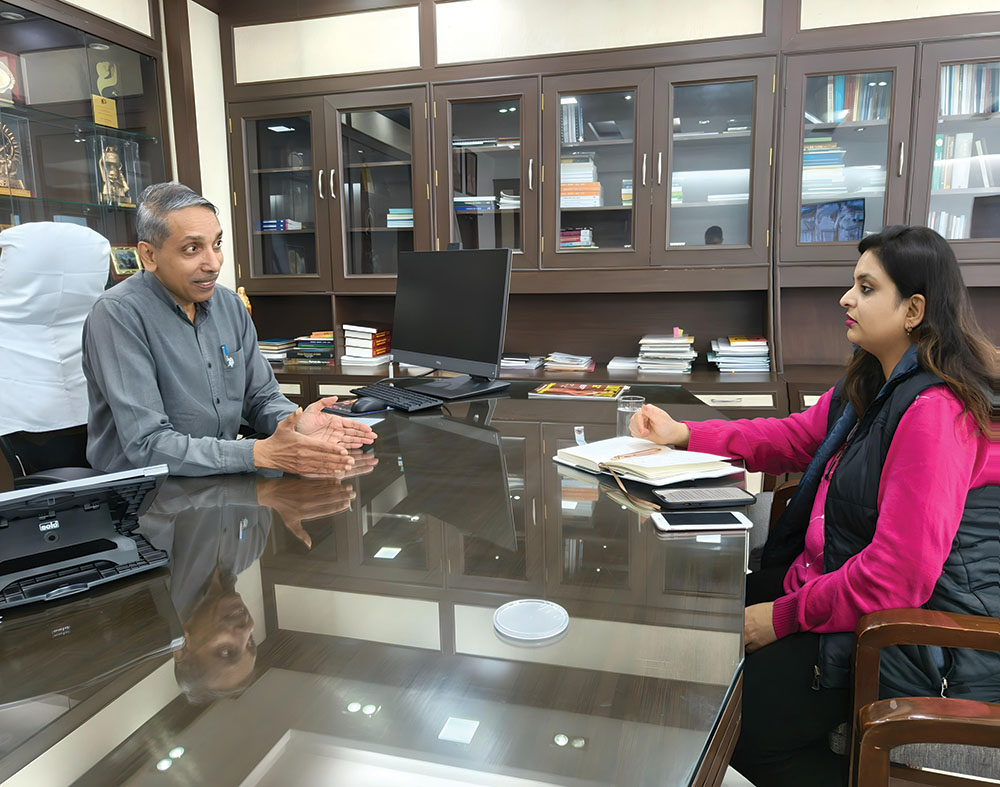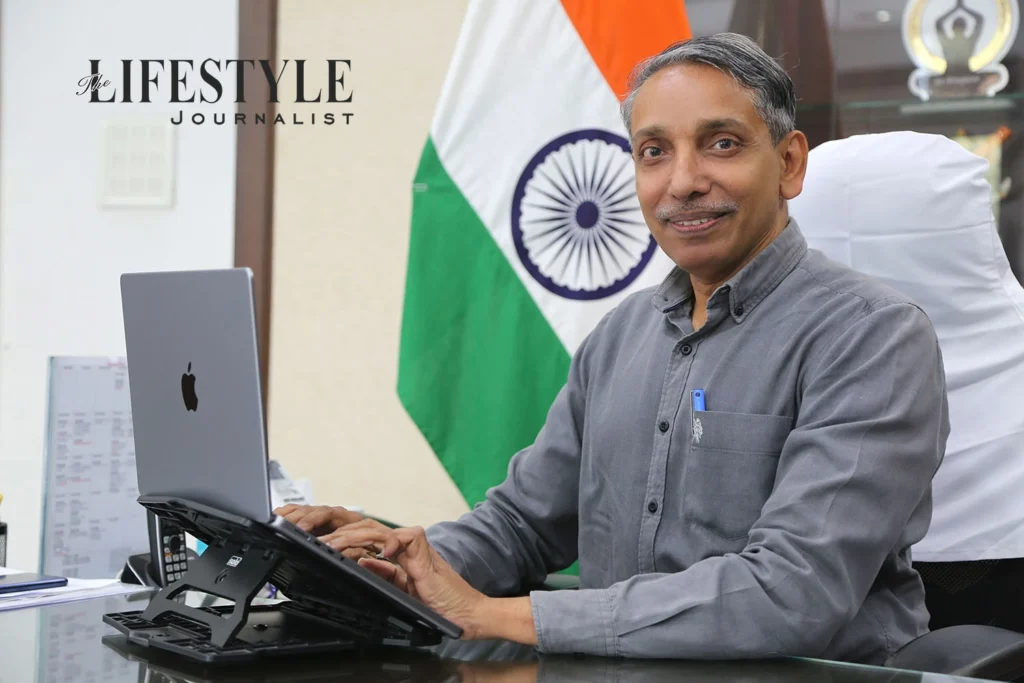Chairman, University Grants Commission Former Vice Chancellor, JNU, New Delhi IIT Delhi Professor
He believes in living in the moment, is a fitness lover (martial arts practitioner), is full of life and enthusiasm, thinks ahead of his time, knows what to talk about, how to conduct, and when to pause. He is a seasoned academician and administrator and understands how to correctly put across positive steps of his organization to the public and shareholders. The best time of his day is when he goes for a walk with his wife. The free atmosphere he and his wife gave their sons during their parenting years has only amplified their interest in science and technology- his own field! These are just cursory mentions of his persona. Here is an interesting conversation, about work and life, between Professor Mamidala Jagadesh Kumar, Chairman of the University Grants Commission, New Delhi and Dr Neha Miglani, Editor of The Lifestyle Journalist Magazine.

You have and implement such interesting, much-needed, out-of-the-box ideas. Why do several stakeholders feel that a gap exists between policies and implementation in Indian universities ?
The evolution of the Indian education system turned it into a rigid and disciplinary one, but it is not that bad. It is a good and one of the largest education systems, which has produced outstanding scientists, academicians, politicians, policymakers, and so on. India’s count of youth is humungous, who want to take risks and experiment but with high aspirations. In any such diverse educational system, implementation of reforms is a longer process which can’t be done overnight. Progress is constant and slow, so sometimes, one may feel that reforms are not reflected immediately on the ground.
Your critics say that whatever you introduce looks fancy on paper.
Challenges on the ground are different. You have to be like a marathon runner; it is not a sprint. Implementing NEP 2020 requires a rigorous process, which is done by creating more awareness among the stakeholders, the students, faculty members and institutions and then motivating them to implement many of these steps.
So, now, because of the efforts that UGC and the Ministry of Education have put in during the last three years, we have a lot of implementation of these reforms happening on the ground. For example, over 200 universities have already implemented the four-year undergraduate program. More than 60 universities have implemented twinning, joint, and dual degree programs. In the academic bank of credits, we have more than six crores students already enrolled on ABC. We hope to raise this number to 10 crores in the coming months.
What role do universities- both government and private have to play in nation-building ?
UGC has formed five zones and zonal committees in the country: The central zone, the Southern zone, the Western zone, the Eastern zone, and the Northeastern zone. In each of these zones, we have had meetings with the vice-chancellors, both private and government. Recently, we met with 270 VCs in the central zone. They told us how they are implementing NEP 2020, where we exchanged and transferred ideas and learnt from each other. We are also looking at the challenges that institutions may face, and simultaneously, we are finding their solutions.
Can you talk about CUET- the new common entrance exam for universities ?
A few days ago, I went to a University with undergraduate students in 1st year from 25 states, which is really good! Unlike earlier, now anybody can write CUET with a basic understanding of the syllabus of Class 12th. We have made it mandatory for all central universities to use only CUET scores for undergraduate admissions. Currently, we have about 270 universities that are using the CUET score. We anticipate that this number will increase further, including central, private, and deemed universities.
National Research Foundation (NRF) is coming up. Are you involved in the formulation or development? What’s the future of NRF ?
National Research Foundation comes under the Ministry of Science and Technology, GoI. However, the Ministry of Education and UGC are closely involved with the formation of the National Research Foundation. The primary objective of NRF is to provide research funding to the university system and to strengthen the research ecosystem in the universities.NRF will have competitive research funding, which will be given to private and state-funded universities. It will be merit-based, irrespective of the person, whether it’s an IITian or any faculty from a recognised university. Last year, we started a scheme of establishing R&D cells in all universities across the country to train faculty to write successful project proposals and manage the projects. There are procedures for appointing technical staff on the projects and so on. And file a patent and then maybe establish a start-up company based on this technology. I am pleased to tell you that through consistent efforts, we have ensured that R&D cells are established in the universities and currently, about 700 universities have R&D cells.
What would you say about discrepancies that have been there about NAAC inspection and its members ?
NAAC is now dedicating efforts to enhancing its system and recognizing institutions’ challenges. To address this, a committee chaired by Dr K Radhakrishnan, the former ISRO chairman, was formed by the Ministry of Education, and it tabled its report in January 2024. The committee’s initiatives aim to attract many institutions towards accreditation. Additionally, a binary accreditation system and a maturity based accreditation system, from levels 1 to 4, will be implemented, with institutions needing to demonstrate excellence nationally for levels 1 to 4 and international recognition for level five. Acknowledging feedback about data entry challenges, in the same report, the “One nation, One data” platform has been recommended to make the process easier. Institutions can input their data into this platform, which will be collected and evaluated by relevant agencies like NIRF, NBA, etc., without disturbing the stakeholders. These reforms will be implemented over the next four months, including introducing binary accreditation.

Coming to a few personal questions about your life, what are your hobbies ?
One of my best hobbies is going for a walk with my wife whenever I can. And, of course, I am a fitness freak; I have practised martial arts for several years. I have learnt karate and yoga and I regularly go to the gym. And this is one thing that I am trying to promote with my staff here. I encourage them to use stairs for general work to regulate physical activities. I got this habit from my father.
How do you De-stress ?
I meditate and do yoga. But to live stress-free, it is important that your spouse is also fit; this point is of paramount importance. We motivate and care for each other’s emotional well-being.
What is your Life mantra ?
My philosophy is ‘Look into yourself, try to understand your inner potential and build on that’. Whatever you do, infuse positivity into your work and the lives of those you engage with. Let your actions contribute to the well-being of others. Bringing positivity through your work can bring immense satisfaction to your life. So that is my philosophy.
Do you have any message for Indian students studying in higher education institute ?
For young people, whether they are students or out of the education system, I want to say there are enormous opportunities, and you have vast potential. What is required is that you make yourself ready for those opportunities. Otherwise, opportunities will come and just go, and you cannot grab them, and then one keeps cribbing that one cannot do anything.

